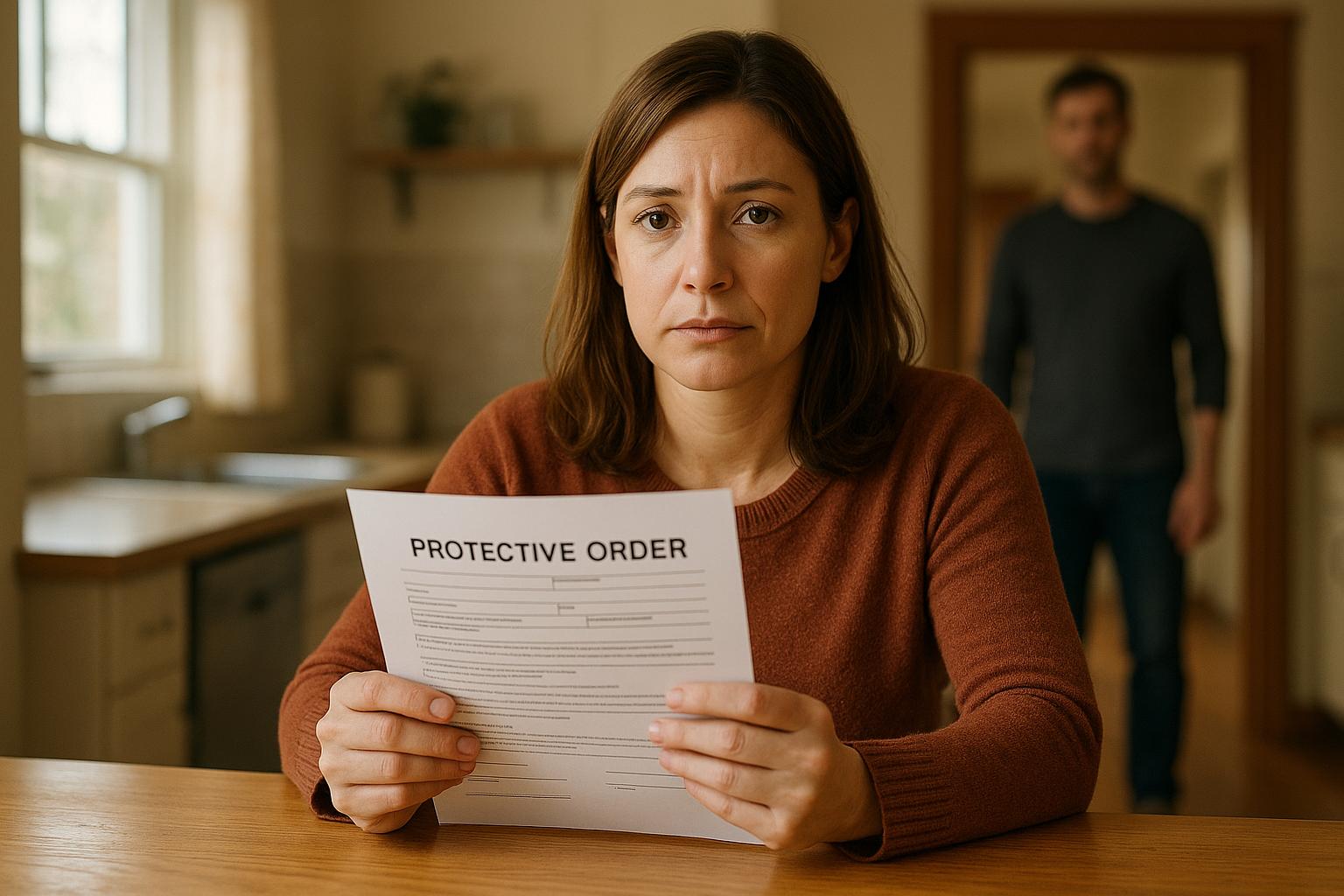Domestic violence in South Carolina involves physical harm, attempts to harm, or threats of harm directed at a household member. Household members include spouses, former spouses, cohabiting partners (including same-sex couples), and individuals with a child in common. Dating partners who have never lived together are excluded.
Key points about SC’s domestic violence laws:
- Degrees of Charges: Offenses are categorized into four levels – Third Degree (misdemeanor) to DVHAN (felony with up to 20 years in prison). Penalties escalate based on injury severity, use of weapons, or prior convictions.
- Abusive Actions: Physical violence, credible threats, and preventing access to help (e.g., blocking 911 calls) qualify as domestic violence.
- Protective Orders: Victims can seek legal protection through various court-issued restraining orders.
- Legal Consequences: Convictions result in fines, jail time, and loss of gun ownership rights.
Understanding these laws ensures victims can seek protection and offenders face accountability.
How South Carolina Law Defines Domestic Violence
In South Carolina, domestic violence is legally defined as causing physical harm, attempting to cause harm, or making a credible threat of harm against a household member. A 2015 amendment to the law increased penalties to provide stronger protection for victims.
According to South Carolina Code § 16-25-20, domestic violence occurs when someone physically harms or injures a household member – or threatens harm in a way that creates a reasonable fear of imminent danger, provided they have the means to carry out the threat. Attorney Truslow explains:
"The basic law on domestic violence in SC is that it is illegal to physically harm or try to physically harm someone with whom you share a special relationship."
This definition requires two key elements: an abusive action and a qualifying relationship between the individuals involved. If either element is missing, the behavior might fall under a different offense, such as assault. This legal framework forms the basis for understanding the specific actions and relationships outlined below.
Main Elements of Domestic Violence
South Carolina law identifies three primary actions that constitute domestic violence:
- Causing Physical Harm or Injury: Any act that results in bodily harm to a household member.
- Attempting to Cause Physical Harm: Actions that demonstrate intent to harm, even if no injury occurs.
- Credible Threats of Harm: Threats that instill a reasonable fear of imminent danger, provided the person making the threat has the ability to follow through.
The statute focuses specifically on physical harm and credible threats. While emotional abuse, financial control, and psychological manipulation can be devastating, they do not meet the legal definition of domestic violence under this law. However, such behaviors may be addressed in other legal contexts.
Who Qualifies as a Household Member?
The law also requires a specific type of relationship between the individuals involved. Under South Carolina Code § 16-25-10, the following relationships qualify as "household members":
- Spouses and Former Spouses: This includes individuals who are no longer married, regardless of whether they live together.
- Individuals with a Child in Common: Even if the individuals were never married or cohabited, having a child together establishes the relationship.
- Cohabiting or Formerly Cohabiting Partners: Initially limited to male and female partners, a 2017 South Carolina Supreme Court ruling expanded this to include same-sex couples.
Relationships outside of these categories – such as extended family members or dating partners who have never lived together – are covered under different statutes.
To secure a conviction for domestic violence, prosecutors must prove both the abusive act and the existence of a qualifying household relationship beyond a reasonable doubt. Even if individuals no longer live together, past cohabitation or a previously qualifying relationship can still result in domestic violence charges.
3 Degrees of Domestic Violence in South Carolina
South Carolina law breaks down domestic violence into four distinct levels, each with increasing severity and corresponding penalties.
Third-Degree Domestic Violence
Third-degree domestic violence is considered the most basic offense in this category. It applies when an individual physically harms a household member, attempts to cause harm, or makes threats that reasonably create fear of immediate danger.
This offense is classified as a misdemeanor, carrying penalties of up to 90 days in jail and fines ranging from $1,000 to $2,500. While it’s the least severe charge, a conviction can still leave a lasting mark on someone’s record, potentially affecting job prospects and housing opportunities.
Second-Degree Domestic Violence
Second-degree domestic violence involves more serious conditions that elevate the charge beyond third-degree. This includes cases where moderate bodily injury occurs – such as temporary disfigurement, fractures, or injuries requiring anesthesia – or when aggravating factors are present, like violating a protective order or having a prior conviction within the past decade.
Additional factors that can lead to a second-degree charge include incidents witnessed by a child, the victim being pregnant, obstructing the victim’s breathing, or preventing them from calling for help. It is a felony offense, with penalties of up to three years in prison and fines between $2,500 and $5,000. In cases where circumstances become even more severe, the charge may escalate to first-degree domestic violence or DVHAN.
First-Degree Domestic Violence and DVHAN
First-degree domestic violence is reserved for situations involving great bodily injury, the use of a firearm, or multiple prior convictions. "Great bodily injury" refers to injuries posing a substantial risk of death, causing permanent disfigurement, or resulting in long-term loss or impairment of bodily functions.
This charge may also apply when a second-degree offense includes additional aggravating factors. First-degree domestic violence is a felony punishable by up to 10 years in prison.
Domestic Violence of a High and Aggravated Nature (DVHAN) represents the most severe category. This charge applies when actions show extreme indifference to human life, result in great bodily injury or death, or involve violating a protective order while committing first-degree domestic violence. Examples include cases where the victim suffers permanent disfigurement, nearly dies, or when a deadly weapon is used. Aggravating factors may include the presence of minors, pregnancy, forced entry, choking attempts, or preventing emergency calls. DVHAN is a felony with penalties of up to 20 years in prison.
Below is a summary of the criteria and penalties for each level of domestic violence in South Carolina:
| Degree | Key Criteria | Classification | Maximum Penalty |
|---|---|---|---|
| Third-Degree | Physical harm, attempts, or threats | Misdemeanor | Up to 90 days jail, $1,000–$2,500 fine |
| Second-Degree | Moderate injury, protective order violation, prior conviction, or aggravating factors | Felony | Up to 3 years prison, $2,500–$5,000 fine |
| First-Degree | Great bodily injury, firearm use, or two prior convictions within 10 years | Felony | Up to 10 years prison |
| DVHAN | Extreme indifference to life, great bodily injury or death, or protective order violation | Felony | Up to 20 years prison |
Types of Abusive Behaviors
Domestic violence goes beyond a single definition, encompassing various abusive actions, each with its own consequences.
Physical Abuse
Physical abuse involves using force to harm someone physically. This includes actions like hitting, slapping, shoving, grabbing, pinching, biting, hair-pulling, and more severe acts like choking or suffocation, which can lead to escalated charges. It may also involve denying medical care or forcing someone to use alcohol or drugs.
For instance, if Bob grabs Becky by the throat and blocks her airway until she nearly loses consciousness, this could lead to a First Degree Domestic Violence charge. In another case, if Bob shoves Becky down the stairs and she breaks her arm, requiring medical attention, he could face a Second Degree charge. Even a slap that leaves a red mark on Becky’s face could result in a Third Degree Domestic Violence charge.
While physical harm is direct and visible, some abusers use intimidation to create fear without laying a hand on their victims.
Threats and Intimidation
Under South Carolina law, domestic violence isn’t limited to physical actions – it also includes threats of harm. For a threat to qualify, it must cause genuine fear and seem realistic, with the person making the threat appearing capable of carrying it out.
For example, if Bob grabs a gun and threatens to shoot both himself and Becky if she tries to leave, this would be considered a domestic violence charge of a high and aggravated nature. Becky, in fear for her life, locks herself in the bathroom and calls the police.
The key here is that the threat must feel immediate and believable. Equally concerning is when abusers take steps to isolate victims by cutting off their ability to seek help.
Blocking Access to Help
Preventing someone from calling for help is another form of domestic violence. This includes using physical force or threats to stop a victim from accessing communication devices, such as a phone, to report an emergency. Such actions can lead to first or second degree domestic violence charges.
For example, if an abuser grabs a phone out of a victim’s hands while they’re trying to call 911, this act of isolation is treated as seriously as physical violence. The law recognizes how critical it is for victims to have access to help and imposes severe penalties for blocking that access.
sbb-itb-ce0cbb0
Legal Protections and Penalties for Domestic Violence
South Carolina law provides immediate protective measures and enforces criminal penalties to address domestic violence effectively.
Protective Orders
South Carolina offers four types of civil protection orders to ensure the safety of victims: Orders of Protection, Restraining Orders, Permanent Restraining Orders, and Emergency Restraining Orders.
- Orders of Protection: Issued by Family Court, these are available to individuals who have experienced physical or sexual abuse – or threats of such abuse – by someone they share a specific relationship with, such as a spouse, former spouse, or household member. These orders also grant broader remedies for victims.
- Restraining Orders: Issued by Magistrate Court, these orders protect individuals facing harassment or stalking, regardless of their relationship with the abuser. This means even if the abuser is not a household member or relative, you can still seek protection.
- Emergency Restraining Orders: Available through Magistrate Court, these orders provide immediate protection for survivors who qualify for a Permanent Restraining Order but have not yet obtained one.
If you’re unsure which protective order is right for your situation, consulting an attorney can help you make the best decision. Alongside these protective measures, South Carolina enforces criminal penalties to further deter domestic violence.
Criminal Penalties
Domestic violence charges in South Carolina range from misdemeanors to felonies, with penalties increasing in severity based on the degree of the offense. For instance, individuals convicted of Third Degree Domestic Violence may have their sentences suspended if they complete a domestic violence intervention program. Additionally, a domestic violence conviction results in the loss of gun ownership rights, adding to the long-term repercussions.
The state’s strict stance on domestic violence is partly driven by its troubling statistics – it consistently ranks among the states with the highest rates of domestic violence-related deaths. Beyond legal penalties, victims have access to various support services to help them rebuild their lives.
Other Legal Options for Victims
In addition to protective orders and criminal sanctions, South Carolina provides a range of legal and support services for victims. For instance, the South Carolina Coalition Against Domestic Violence and Sexual Assault (SCCADVASA) offers free legal help through its Legal Assistance to Victims Program. This program connects victims with attorneys to address issues like protective orders and other legal concerns.
Victims can also register with the South Carolina Department of Corrections to stay informed about an offender’s custody status, including releases or transfers. This service can be accessed by calling 803-896-1733 or 1-800-835-0304.
The Fourteenth Circuit Victims Services Center provides a centralized hub for support. In 2017, Solicitor Duffie Stone created a Special Victims Unit (SVU) to focus on prosecuting cases involving domestic violence and sexual assault. This team, which includes prosecutors, victim advocates, and investigators, has handled over 415 cases in its first two years, with an impressive 75% conviction rate in jury trials.
"Restoring their peace of mind and their autonomy is part of seeking justice, as far as I’m concerned." – Solicitor Duffie Stone
The Center offers a wide range of services under one roof, including shelter arrangements, financial aid, childcare, and legal support. This approach reduces the burden on victims, sparing them from repeatedly recounting their experiences.
For immediate help, victims can call the National Domestic Violence Hotline at 1-800-799-SAFE for safety advice and referrals to local resources. The Fourteenth Circuit Victims Services Center can also be reached at 843-790-6220.
| Legal Assistance Programs | Services Provided | Contact Information |
|---|---|---|
| South Carolina Legal Services (SCLS) | Assistance with orders of protection and divorce cases involving physical abuse | sclegal.org |
| South Carolina Victim Assistance Network | Consultations on victim rights and general legal issues | scvanlegal.org |
| Charleston Pro Bono Legal Services | Legal support for survivors of human trafficking | charlestonprobono.org |
Through these protections and services, South Carolina demonstrates its commitment to addressing domestic violence with both immediate safety measures and long-term resources for survivors.
Conclusion: Taking Action Against Domestic Violence
Getting familiar with South Carolina’s domestic violence laws is a crucial step in protecting yourself or someone you care about. The state has a legal framework that addresses different degrees of domestic violence charges, offers protective orders, and provides resources to help survivors rebuild their lives. Knowing these options empowers you to take meaningful steps toward safety and support.
If you’re in immediate danger, call 911. This is the fastest way to get protection when you or someone else is at risk.
For ongoing support, South Carolina has local programs like SCCADVASA that offer confidential assistance. These organizations can help you develop a safety plan, explore your options, and connect with legal resources.
Seek legal action with proper guidance. Whether you’re pursuing a protective order, filing criminal charges, or considering civil remedies, it’s important to understand your options. Protective orders can be obtained through Family Court or Magistrate Court depending on your circumstances. Additionally, you can register for victim notifications through the South Carolina Department of Corrections by calling 803‑896‑1733 or 1‑800‑835‑0304 to stay informed about an offender’s custody status.
Having professional legal representation can make a significant difference in domestic violence cases. Whether you’re seeking protection or facing charges, an experienced attorney can help you navigate the legal system. At Brendan M. Delaney Law Firm LLC, we bring over 24 years of experience in criminal defense and family law to provide dedicated representation.
For confidential help, reach out to your local domestic violence program. You can also explore legal resources through platforms like WomensLaw.org or consult with an attorney to better understand your rights and options. Taking action today can help you break the cycle of abuse and build a safer future.
FAQs
What legal protections are available for domestic violence victims in South Carolina?
Victims of domestic violence in South Carolina are supported by various legal protections aimed at ensuring their safety and providing assistance. The Protection from Domestic Abuse Act allows victims to request restraining orders to prevent further harm. In certain cases, landlords are also required to let victims break their rental agreements without facing penalties.
South Carolina law recognizes both physical abuse and nonphysical abuse, such as coercive control, giving victims legal avenues to address a range of abusive behaviors. Recent legislative updates have bolstered these protections and expanded available resources for those impacted by domestic violence. Victims may also qualify for assistance programs and, under certain conditions, work toward clearing domestic violence-related records.
If you or someone you know is facing domestic violence, understanding the rights and protections available under South Carolina law is a crucial step toward safety and justice.
What are the different levels of domestic violence charges in South Carolina?
South Carolina law defines domestic violence in three levels, classified by the severity of the act and the circumstances involved.
- Third-degree domestic violence is considered the least severe. It usually involves minor injuries or threats that don’t result in significant harm.
- Second-degree domestic violence is more serious, often including notable injuries, repeated offenses, or situations where a child could be harmed.
- First-degree domestic violence is the most serious category, involving severe bodily harm, the use of a deadly weapon, or violations of protective orders.
The penalties for each degree vary, with harsher consequences for more severe offenses. If you or someone you know is dealing with a domestic violence issue, understanding these classifications is crucial, and seeking legal assistance can make a significant difference.
What can I do if I’m experiencing domestic violence in South Carolina but don’t qualify as a ‘household member’ under the law?
If you’re in South Carolina and facing domestic violence but don’t meet the legal definition of a household member, you still have ways to protect yourself. One option is to seek a restraining order or protective order, which are available regardless of your connection to the abuser.
Reaching out to local law enforcement or consulting with an attorney is a crucial step. They can help you understand your rights and guide you through the process of filing for protection or exploring other legal options. You’re not alone in this – support and resources are available to help keep you safe.





